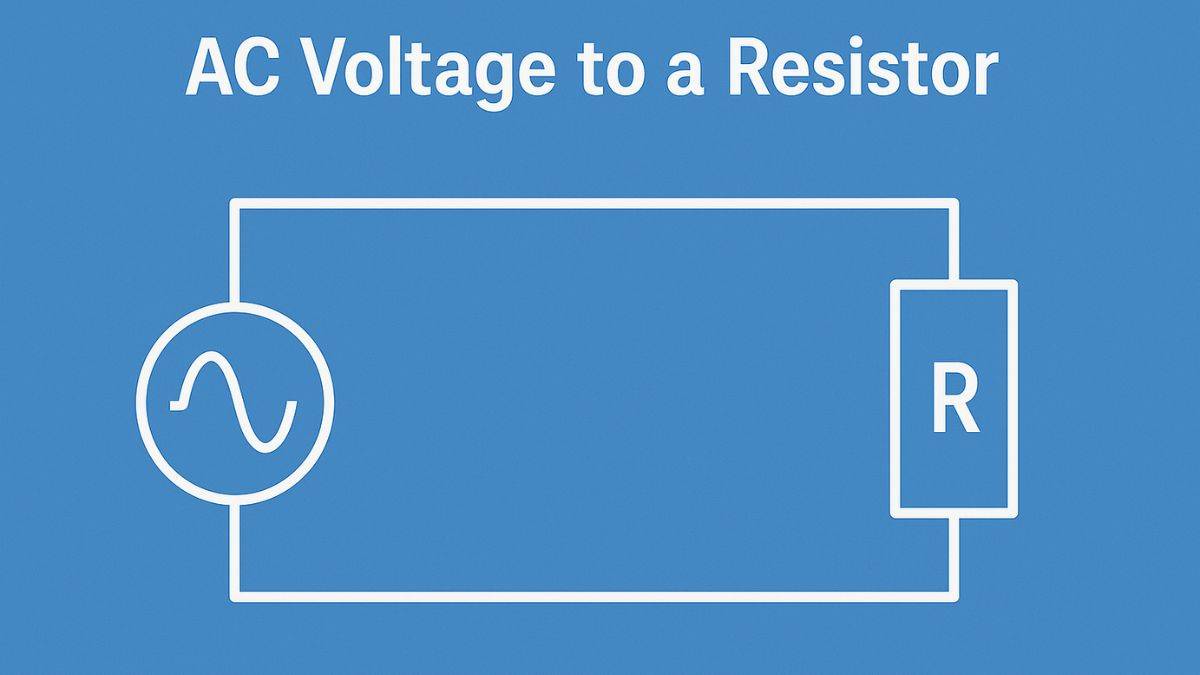
In your Alternating Current chapter, you will be learning that Ohm's Law dictates electrical circuit behaviour in the same way for AC voltage when connected to a resistor as it does for DC circuits. We can call this a resistive AC circuit, where the current syncs perfectly with the voltage that you apply. This resistor does not introduce any phase difference.
- What is a Resistor?
- AC Voltage Across a Resistor: Key Concept
- AC Voltage Applied to a Resistor: Key Characteristics
What is a Resistor?
A resistor is an electronic component that opposes the flow of electricity. It is used to control the amount of current and divide the voltage. The unit of resistance is the Ohm (Ω).
Also Read: NCERT Solutions
AC Voltage Across a Resistor: Key Concept
When an AC voltage is applied to a resistor (R), the current and voltage remain in phase. This means, when the voltage is at its peak, so is the current. Also, the behaviour of the circuit is governed by Ohm's Law and the properties of AC signal.
Also Read: Class 12 Physics NCERT Solutions
Mathematical Representation
The applied AC voltage is:
Where,
- is the peak voltage.
- 𝜔 is the angular frequency (ω=2πf, where 𝑓 is the frequency)
- t is time
According to Ohm's Law:
Where the peak current is expressed as:
Phase Relationship:
V(t) ∝ I(t)
Power in a Resistor in AC Circuit
Instantaneous power:
Using we get
Average power (over a full cycle):
where,
AC Voltage Applied to a Resistor: Key Characteristics
Here, we have provided the key characteristics of applying AC voltage to a resistor.
| Property |
Behaviour in Resistor |
| Power |
Positive |
| Energy Conversion |
Electrical → Heat |
| Voltage & Current |
In Phase |
| Reactance |
None |
Important Links:
| NCERT Class 11 notes | |
| Class 11 Chemistry NCERT notes |
Physics Alternating Current Exam
Student Forum
Other Topics under this Chapter
- Coulomb's Law
- Power in AC Circuit
- Representation of AC Current and Voltage by Vector
- AC Voltage applied to a Series LCR circuit
- AC Voltage applied to a Capacitor
- AC Voltage Applied to an Inductor
- AC Voltage Applied to a Resistor
- Alternating Current Overview
- Combination of Resistors - Series and Parallel
- Temperature Dependence of Resistivity
- Potentiometer
- Application of Gauss's law
- Electric Dipole
- Electric Flux
- Gauss Law
Other Class 12th Physics Chapters
- Physics Alternating Current
- Physics Ray Optics and Optical Instruments
- Physics Electromagnetic Induction
- Physics Dual Nature of Radiation and Matter
- Physics Semiconductor Devices
- Physics Wave Optics
- Physics Current Electricity
- Physics Nuclei
- Physics Electrostatic Potential and Capacitance
- Physics Atoms
- Physics Moving Charges and Magnetism
- NCERT Class 12 Notes
- NCERT Class 12 Physics
- Physics Electric Charge and Field
- Physics Electromagnetic Waves
- Physics Magnetism and Matter
Popular Courses After 12th
Exams accepted
CA FoundationExams accepted
ICSI ExamExams accepted
BHU UET | GLAET | GD Goenka TestBachelor of Business Administration & Bachelor of Law
Exams accepted
CLAT | LSAT India | AIBEExams accepted
IPMAT | NMIMS - NPAT | SET
Exams accepted
BHU UET | KUK Entrance Exam | JMI Entrance ExamBachelor of Design in Animation (BDes)
Exams accepted
UCEED | NIFT Entrance Exam | NID Entrance ExamBA LLB (Bachelor of Arts + Bachelor of Laws)
Exams accepted
CLAT | AILET | LSAT IndiaBachelor of Journalism & Mass Communication (BJMC)
Exams accepted
LUACMAT | SRMHCAT | GD Goenka Test

